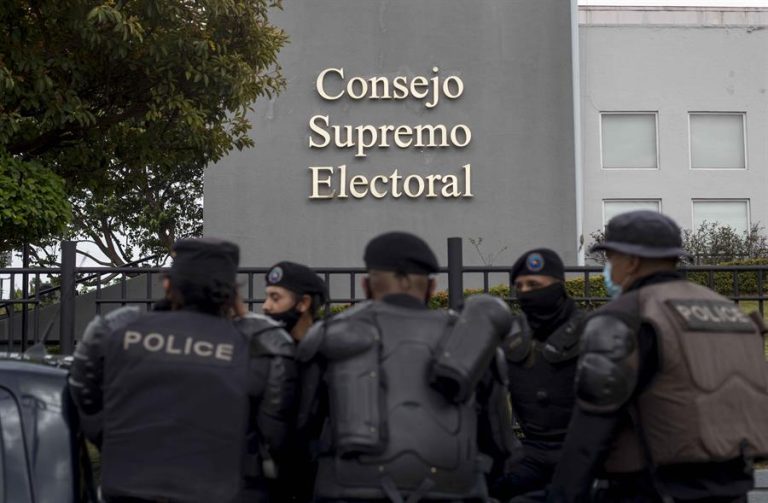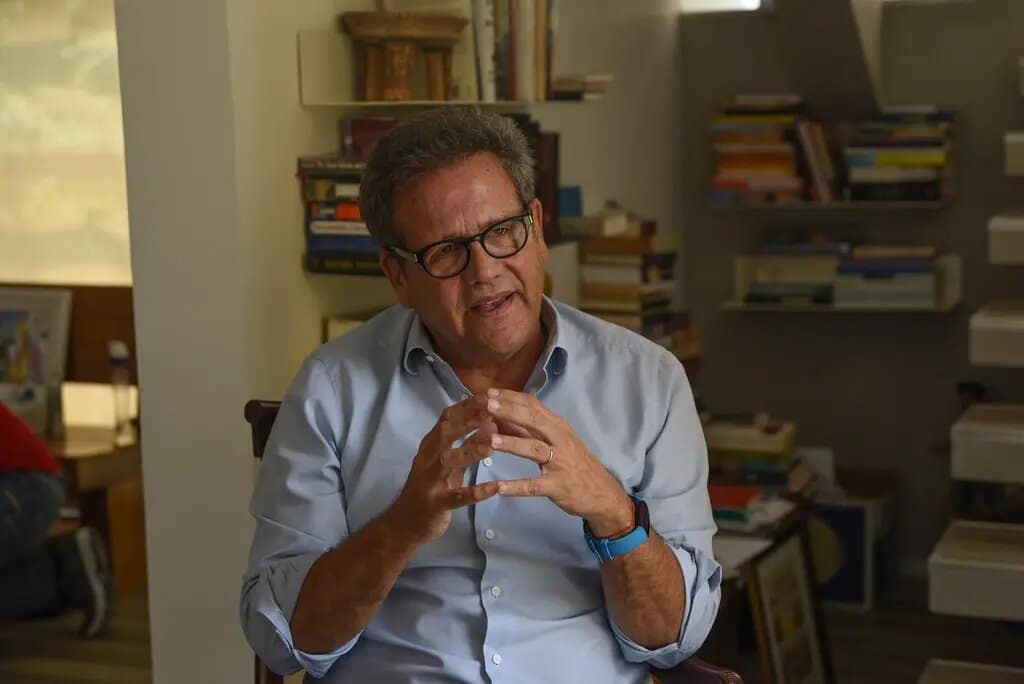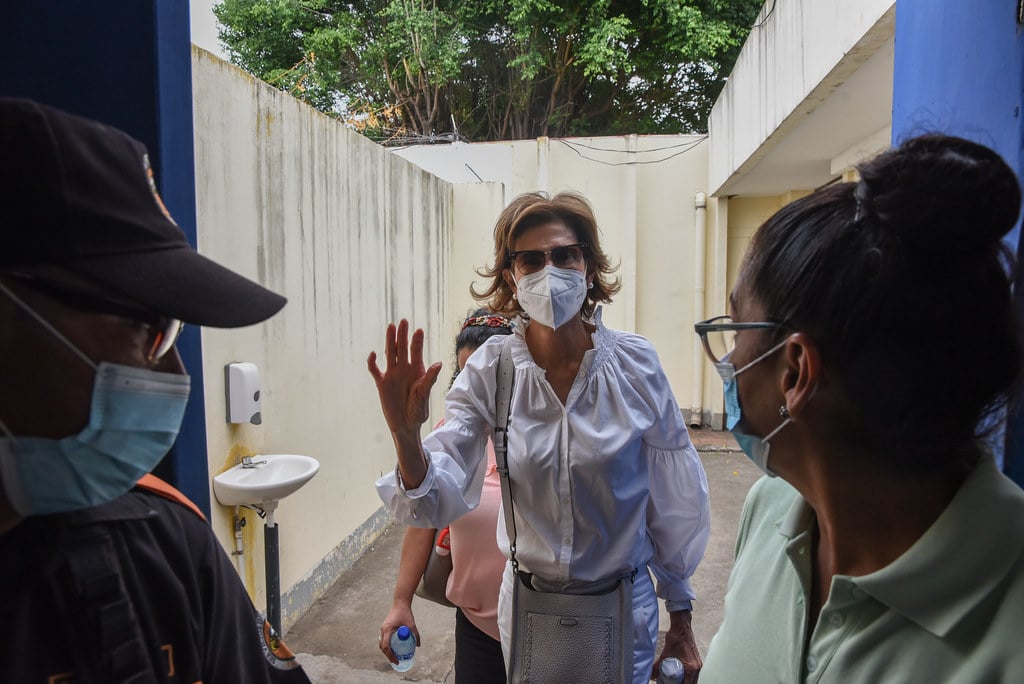7 de junio 2021

The Return of the Military

PUBLICIDAD 1M
PUBLICIDAD 4D
PUBLICIDAD 5D
Two presidential aspiring candidates were imprisoned and prosecuted, one summoned by the Attorney General's Office and three are exposed to inhibitions

View of the headquarters of the Supreme Electoral Council (CSE), in Managua. Photo: EFE
With only five months left until the November 7 elections, Daniel Ortega and Rosario Murillo’s regime has used its legal and repressive apparatus to close the electoral space in the last days, at a time when the registration of candidates and the electoral campaign has not yet officially begun.
This week, Cristiana Chamorro Barrios and Arturo Cruz, two presidential aspiring candidates of the opposition, were processed and imprisoned; Felix Maradiaga is being threatened with inhibitions and was summoned to the Prosecutor's Office this Monday; and three more: Juan Sebastián Chamorro and Medardo Mairena, in the Alianza Ciudadana, and Miguel Mora, in the PRD (stripped of its legal status) are exposed to inhibitory laws; in a coup by the dictatorship to eliminate electoral competition, according to legal experts and political analysts consulted by CONFIDENCIAL.
The most recent phase of this escalation was experienced twice this Saturday. In the morning, aspiring candidate Arturo Cruz was arrested at the Augusto C. Sandino International Airport, when he was returning from a personal trip to the United States. In the afternoon, Felix Maradiaga, the aspiring candidate of the opposition group National Blue and White Unity (UNAB), was summoned by the Public Prosecutor's Office to appear today, June 7, at the Public Prosecutor's Office headquarters in Managua.
"We are reaching the point of no return, unfortunately. Many organizations, sectors and individuals have advocated and made the greatest effort to leave the electoral path open; (however), at the same time, Ortega has closed all these spaces", said constitutional lawyer Gabriel Alvarez during an interview with the program Esta Semana, to be broadcast this Sunday night on the CONFIDENCIAL YouTube channel.
"Everything indicates that the electoral process is a handcuffed, blindfolded and flogged process; this is how we are walking into November 7," he added.
Alvarez stressed that the regime's attitude "shows that Ortega was not capable of resolving the crisis. At this point, he cannot turn back because it would be a problem with his own bases".
For the ex-guerrilla and founder of the Sandinista Renovation Movement (MRS), Dora María Téllez, dictator Ortega is "totally desperate" and has "given up" on elections next November 7, in which "he pretended that the opposition was participating".
"(Ortega) has decided to completely sweep away all opposition possibilities, all candidacy options and all ballot box options; he is going to be the only one on the ballot, with his stilted parties, of absolute confidence," commented the historian.
"Ortega realized that even in a cheating election, which he had designed, he would be ruined at the ballot box", she added.
The Prosecutor’s Office and the National Police are investigating Cruz for allegedly violating the Law for the Defense of the People's Rights to Independence, Sovereignty and Self-Determination for Peace, better known as the "Guillotine Law".
This legislation, passed last December, prohibits those who are "traitors to the Homeland" according to the regime, from running for elected office. They also face sentences of between two and 20 years in prison.
For the regime, based on this law, "traitors" are citizens who: lead or finance a coup d'état; who alter the constitutional order; who promote or urge terrorist acts; who request military interventions; who propose and manage economic blockades against the country; and "those who demand, exalt and applaud the imposition of sanctions against the State of Nicaragua and its citizens".
Uriel Pineda, specialist in human rights, explained that the professor’s "detention" is "illegal", because at the time of the arrest there was no formal accusation from the Attorney General's Office against Cruz; furthermore, the academic was not found in flagrante delicto in a criminal act; which are the only two grounds for capturing a citizen.
In a press release, the Prosecutor’s Office informed that Cruz was arrested because the National Police is investigating him for "having strong indications that he has infringed upon Nicaraguan society and the rights of the people", based on the so-called "Guillotine Law".

Arturo Cruz. // Photo: Nayira Valenzuela | Confidencial
The former Nicaraguan ambassador to Washington is the first citizen to be detained under this legislation. For Pineda, this law "is a tool of political inhibition for opponents" and "an invention of the regime to criminalize the demand for freedom and democracy in Nicaragua".
The professor registered his candidacy last April 26 in the selection mechanism of the presidential aspiring candidates of the opposition block integrated by the Citizens for Liberty party (CxL) and the Civic Alliance for Justice and Democracy (ACJD).
Sources linked to Cruz's family indicated that the academic is being held in the new facilities of the Judicial Assistance Directorate (DAJ), known as "el nuevo Chipote", where he has had no contact with his lawyer and family members.
Maradiaga, the UNAB aspiring candidate, informed that the document of the Prosecutor's Office "does not specify any criminal cause nor the condition" under which he is summoned, "which reaffirms the arbitrariness and legal defenselessness to which the Nicaraguan citizens are subjected".
He added: "on Monday I will attend the summons of the Public Ministry with all the serenity of someone who has never committed any illicit act. I reaffirm my solidarity with all our Nicaraguan brothers and sisters who suffer political imprisonment and rigged trials".
"As I have always maintained, all my actions are in favor of democracy, the defense of human rights and the search for justice, I have carried them out in strict adherence to the principles of non-violence, ethical coherence and integrity," said the aspiring candidate in a statement.
"Since 2018, a series of injurious judicial accusations have been made against me with the purpose of silencing me. They did not succeed before and they will not succeed today", he added.
Last Thursday, the Supreme Electoral Council (CSE) published an agreement in which it reminded political parties and alliances that their candidacies must comply with "all provisions and requirements" established in the laws. According to analysts, their aim is for the Citizens Alliance for Liberty (ACxL), which is the only electoral vehicle left to the opposition, to restrict the inscription of aspiring candidates who actively participated in the civic rebellion of 2018, which the regime qualifies as a "coup attempt"
According to analysts, the aspiring candidate who would be targeted for their participation in the April 2018 protests are: Juan Sebastián Chamorro, from the Civic Alliance; Félix Maradiaga, from UNAB; and Medardo Mairena, from the Peasant Movement; who are part of the internal competition of the Citizen Alliance, and journalist Miguel Mora, registered in the PRD, which was stripped of its legal status.
"The dictatorship is desperate because it knows that the opposition, despite so much sacrifice and effort, has unified into a single bloc. The fact of having set foot in the Citizens' Alliance, and bringing in the leaderships that we have built within the National Coalition, that made him nervous, and now he intends to apply the laws that he made with the intention of inhibiting us", assured Medardo Mairena, in an interview with the program Esta Semana, to be broadcast this Sunday night on CONFIDENCIAL's YouTube channel.
Dora María Téllez predicted that, by next week, the regime will take action against aspiring candidates Juan Sebastián Chamorro and Medardo Mairena.
"(The regime) first did not succeed in trying to divide the opposition, then it did not succeed in trying to liquidate the National Coalition because all the candidates (of that opposition platform) decided to accept the possibility opened by the Citizens' Alliance", said the ex-guerrilla.
"That completely took away control from the regime; when they saw that the possibility of holding an election in a totally controlled model was slipping away", she added.

The presidential candidate Cristiana Chamorro Barrios arrives at the Attorney General's Office on Thursday, May 27. Photo: Nayira Valenzuela | Confidencial
In the last two weeks, the Attorney General's Office has summoned and "interviewed" 45 citizens in relation to an investigation for alleged money laundering against the closed Violeta Barrios de Chamorro Foundation (FVBCh). According to CONFIDENCIAL's records, among those summoned by the Public Prosecutor's Office are journalists, media owners, former workers of the NGO, owners of private companies and intellectuals.
Due to this case, the former president of the FVBCh and independent presidential aspiring candidate, Cristiana Chamorro Barrios, has been under house arrest, isolated and under heavy police surveillance, since last Wednesday, June 2.
Chamorro has been accused by the Prosecutor's Office "for the crimes of abusive management and ideological falsehood, both in real concurrence with laundering of money, goods and assets" through the FVBCh.
Parallel to this process, Chamorro was disqualified to participate in the elections of next November. Through the Fifth Criminal District Court of Hearings, the Prosecutor's Office requested the disqualification of Chamorro "to hold institutional and public positions, for not being in full enjoyment of her civil and political rights, for being in a criminal investigative process".
Chamorro’s arrest has raised an enormous wave of national and international rejection, which was reactivated with the arrest of Cruz. For political analyst Eliseo Núñez Morales, "Ortega is determined to close the electoral game and assume the illegitimacy that would follow".
The United States has warned that it is involved in "conversations" with governments of the European Union (EU) and Latin America to "respond" to the situation in Nicaragua, according to Juan Sebastián González, advisor for Latin American issues at the US National Security Council, in declarations to the Voice of America.
"We are definitely looking at what actions we are going to take to respond, not just unilaterally. As this Administration has said: 'to have the greatest effect we have to work multilaterally,'" the advisor commented.
In the U.S. Congress last April, the Renacer Act initiative was introduced, which proposes that Joe Biden's administration make "diplomatic efforts" with the governments of Canada, the EU and Latin American and Caribbean countries "to impose selective sanctions" against citizens who obstruct the Nicaraguan elections.
Núñez commented that the "calculations" of the regime include the application of more sanctions against it. "(Ortega) hopes that in a few years the international environment will change in his favor."
Since mid-2018, the US has sanctioned at least 27 individuals linked to the dictatorship, among them high-ranking officials, deputies and members of the presidential family. Added to the list are nine public institutions or mixed entities, including the National Police.
"This challenge by Ortega to the United States and the European Union is going to have severe consequences for the corrupt Ortega-Murillo oligarchy, and for the majority of Nicaraguans," warned Téllez.
Following Cruz's arrest, Julie Chung, the State Department's Acting Assistant Secretary for Western Hemisphere Affairs, demanded his freedom from the Sandinista government, which she described as an "international pariah".
On her Twitter account, Chung wrote: "The United States calls for the immediate release of Nicaraguan opposition leader Arturo Cruz. The international community has spoken: regarding Ortega, Nicaragua is becoming an international pariah and moving further and further away from democracy."
The Secretary General of the OAS, Luis Almagro, indicated that "the manipulation of security forces and the judiciary (to) imprison opposition candidates is unacceptable, which puts Nicaragua outside of inter-American legality. These actions are contrary to free and fair elections".
This article was originally published in Spanish in Confidencial and translated by Ana María Sampson
Archivado como:
PUBLICIDAD 3M
Confidencial es un diario digital nicaragüense, de formato multimedia, fundado por Carlos F. Chamorro en junio de 1996.
PUBLICIDAD 3D